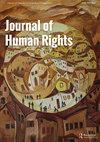The future of human rights: A research agenda
IF 1.6
2区 社会学
Q3 INTERNATIONAL RELATIONS
引用次数: 1
Abstract
In turbulent times, we stand at the leading edge of human rights. The previous generation of human rights scholarship debated the balance between a rising tide and an end times of human rights. From where we stand, we can discern both directions — and looking ahead, rising issues in the distance. Our research can only glimpse the social problems and power relations emerging at the horizon. These phenomena pose challenges to the continuing construction of human rights as a movement to expand norms and practices of who is human , what is right , and who is responsible . The human rights agenda sits at the crossroads of historic progress and hard times. On the one hand, the arc of history bends through consequential advocacy campaigns — from antislavery to anti-apartheid, expanding rights frames, and a growing interactive regime of global, regional, national, local, and transnational institutions for monitoring, advocacy, socialization, capacity building, and accountabil-ity — that culminates in an unprecedented justice cascade. On the other hand, historic governance gaps threaten the lives, liberties, and well-being of people displaced from their homes, livelihoods, and identi-ties by global forces beyond their control — from conflict to disaster to distorted development — while gender-based violence affects an estimated one of three women and girls worldwide. On every contin-ent, illiberal ethnonationalists degrade democratic institutions, minorities and migrants, women ’ s rights, sexual orientation and gender identity (SOGI) rights, and global governance, often posing counternorms to rights based in religious or populist claims: notably, in the United States, India, Turkey, Brazil, Hungary, Poland, the Philippines, and Israel. analytic to the This and rights-bearing人权的未来:研究议程
在动荡时期,我们站在人权的前沿。上一代人权学者就人权的兴起和终结之间的平衡进行了辩论。从我们的立场来看,我们可以看到两个方向——展望未来,远处不断出现的问题。我们的研究只能窥见地平线上出现的社会问题和权力关系。这些现象对人权的持续建设构成了挑战,这是一场扩大谁是人、什么是权利和谁负责的规范和实践的运动。人权议程正处于历史进步和困难时期的十字路口。一方面,历史的弧线通过相应的宣传运动而弯曲——从反奴隶制到反种族隔离,扩大权利框架,以及由全球、地区、国家、地方和跨国机构组成的日益互动的监督、宣传、社会化、能力建设和问责制度——最终形成了前所未有的司法级联。另一方面,历史性的治理差距威胁着被他们无法控制的全球力量(从冲突到灾难再到扭曲的发展)从家园、生计和身份关系中流离失所的人的生命、自由和福祉,而基于性别的暴力影响着全世界约三分之一的妇女和女孩。在每一个大陆上,不自由的民族主义者都贬低民主制度、少数民族和移民、妇女权利、性取向和性别认同(SOGI)权利以及全球治理,经常对基于宗教或民粹主义主张的权利提出反规范:尤其是在美国、印度、土耳其、巴西、匈牙利、波兰、菲律宾和以色列。对此与权利承担的分析
本文章由计算机程序翻译,如有差异,请以英文原文为准。
求助全文
约1分钟内获得全文
求助全文

 求助内容:
求助内容: 应助结果提醒方式:
应助结果提醒方式:


